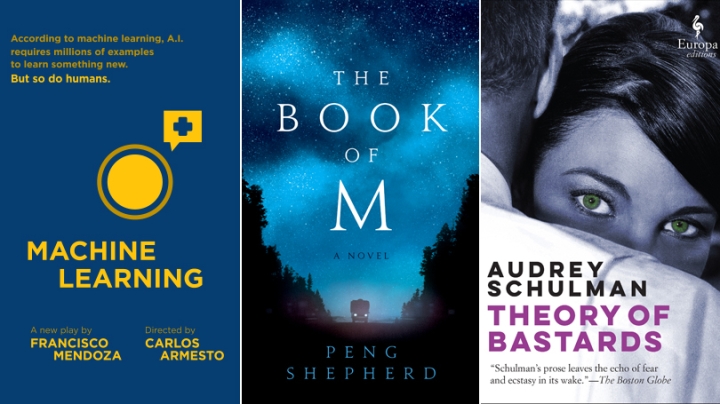Working from a shortlist of imaginative pieces that question human nature, the nature of technology, and the state of the natural world, the Neukom Institute for Computational Science has announced the winners of the 2019 Neukom Institute Literary Arts Awards for speculative fiction and playwriting.
The winners:
• 2019 Neukom Institute Literary Arts Award for Speculative Fiction (Debut Category): Peng Shepherd, The Book of M (William Morrow, 2018)
• 2019 Neukom Institute Literary Arts Award for Speculative Fiction (Open Category): Audrey Schulman, Theory of Bastards (Europa Editions, 2018)
• 2019 Neukom Institute Literary Arts Award for Playwriting: Francisco Mendoza, Machine Learning
“The shortlisted and winning titles arrive perfectly timed with the summer reading season,” says Dan Rockmore the William H. Neukom 1964 Distinguished Professor of Computational Science and director of the Neukom Institute. “The books and plays that we have recognized are a great place to find some fascinating - if sometimes disturbing - stories for readers to dig into.”
Speculative Fiction Page-Turners
Peng Shepherd won the debut book category for her novel The Book of M, in which ordinary people in a near-future world are caught in “the Forgetting,” an epidemic of memory loss. Shepherd’s book explores fundamental questions of memory, connection, and morality in a world where the lights have gone out.
“It’s an outstanding first novel. Very ambitious, highly imaginative, and hits all the right emotional beats. Parts of it took my breath away,” says Ann VanderMeer.
The open book category winner, Audrey Schulman’s Theory of Bastards, is an exploration of survival and evolution. Set in a primate reserve research facility in the near future, the book tackles questions of connection, communication, love, and respect among humans and their closest evolutionary relatives, as well as between the species.
“Beautifully written, provocative, and yet highly satisfying, this novel took lots of risks. And it paid off in this remarkable story. Unlike many dystopian novels, this one gives you hope for humanity and the future without being sentimental,” says VanderMeer.
Shepherd and Schulman will visit Dartmouth in October to participate on a panel with Rockmore and the VanderMeers to discuss their works and the speculative fiction genre.
“One of the unique qualities of the Neukom Awards includes this wonderful opportunity for dialogue and discussion around the winning books. And especially at this critical time in our collective history, it’s useful to come together over how speculative fiction can help us find a way to a better future,” says Jeff VanderMeer.
Speculative Fiction for the Stage
The 2019 Neukom award winner for playwriting is Francisco Mendoza, whose play “Machine Learning” draws on insights from the immigrant experience and the human relationship with technology to detail how a computer scientist’s intelligent nursing app both repairs and complicates his troubled relationship with his father.
Mendoza will receive assistance with the play’s development in the form of a reading with VoxFest at Dartmouth College in July, and a staged reading at Northern Stage in White River Junction, Vt., during the 2019/2020 season.
“Francisco has written a moving and complicated vision of our potential future,” said Jess Chayes, associate artistic director of Northern Stage. “What distinguishes Machine Learning is its use of a story about artificial intelligence to isolate and examine the very things that make us human. Northern Stage is thrilled to be partnering for the second year with the Neukom Institute, and looks forward to contributing to the development of this play.”
The book awards were judged by Ann and Jeff VanderMeer, well-known veterans of the speculative fiction community. The play award was judged by a panel of experts from Northern Stage, VoxFest, Dartmouth’s Department of Film and Media Studies, Dartmouth’s Department of Theater, and the theater company The Civilians.
“The Neukom Awards relies on the talents - and contributions - of its community of readers, judges and advisors to make the program a success. The Neukom Institute wishes to thank all of those that have pitched in,” says Rockmore.
The awards program is part of the Neukom Institute’s mission to explore the possibilities of computational science, including the ways in which computational ideas have an impact on society.
“The speculative fiction genre just seems to get more and more interesting. These works demonstrate how the setting of an imagined future can be used to explore and expose universal questions of human nature,” says Rockmore.
In addition to an opportunity to develop and discuss their work, each award winner will receive a $5,000 honorarium.
For more on the awards program or the winners, visit the Neukom Institute awards website at: https://sites.dartmouth.edu/neukominstitutelitawards/
David Hirsch can be reached david.s.hirsch@dartmouth.edu.


